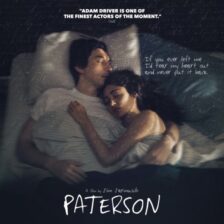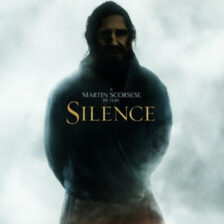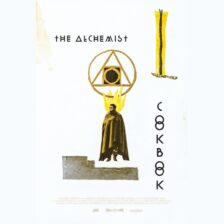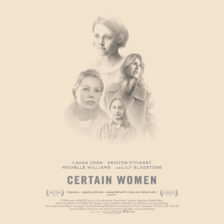When we think back on our lives, even on a relatively small scale like, say, the week we just had, we tend not to think on every minute of minutiae we endured. We think of the relatively big things we went through, the stuff that was memorable. Sure, we all eat and have conversations and go to work and sleep and wake up, but we tend to only process it as a necessity: it’s the minute to minute, day to day of being. What’s important to understand, however, is that every second we live, every small little thing we go through, informs literally everything else about us. It’s all a flow of life that causes us to react, to process information, to make decisions, to move forward. It’s the process of life, and it’s the context for who we are as people, and our identities are as grand and important a concept as we’ll ever grapple with.
Review: Silence
Where to even begin with Silence.
Martin Scorsese is my favorite filmmaker. The Departed is a masterwork that served as mine and countless other’s introduction into the world of cinema. To survey the diverse array of films Scorsese has made is to attend film school: to learn how to read a visual story, to realize that every frame has meaning and is communicating something and that, when done expertly, the experience of a film can be profound. It’s to learn the ID of Scorsese: the themes he’s preoccupied with, the ideals he’s interested in exploring. Faith is one of those ideas. The Last Temptation of Christ is likely his masterpiece, a film about Jesus Christ, a legend treated as more than man, and it tests his faith and what his martyrdom means on a human level. Silence is about an ordinary human, not the son of God, facing a similar test of faith. When Scorsese tells this story about a real man in the real world, the grim realities of slavish devotion to faith and dogmatic thinking are exposed for the true devastation they wreak. Faith and morality are not so easily reconciled together.
Review: The Love Witch
No film in 2016 is more gorgeous to watch than The Love Witch, shot in 35mm and stylized so precisely in every aspect. From the stunning costumes to the popping colors of the cinematography, the carefully constructed sets and the way light shines so perfectly on every object the characters interact with, the film is a visual masterwork. Director Anna Biller, who also wrote the script, edited the film, decorated the sets, and made the costumes, has brought to life an aesthetic vision unlike anything else made this year. Every frame is glorious, the cinematography so absurdly beautiful, an audience is hypnotized. Transfixed by such a magnificent visual work, we’re taken along for a ride for a film about a witch who endlessly seduces men and then, when each one inevitably disappoints her, kills them.
Review: The Alchemist Cookbook
A man lives alone in the woods with his cat, attempting to use alchemy to summon the devil and create riches for himself. Plotwise, that’s about all there is to Joel Potrykus’ The Alchemist Cookbook, a film that I find hard to organize thoughts on. Much of what I like about it lies just beyond the grasp of my ability to verbalize, possibly because what I enjoyed so much in the film doesn’t quite feel concrete, and might more come from the feeling the film captures. This is a film with an aura, and for a film that deals so much with the implied, or presences more felt than seen, the balance is an accomplishment for Potrykus.
Review: Moonlight
No one is any one thing. Our identities have history, they are shaped by what is always inside us and how we react to external influences, two storms constantly colliding in our hearts and minds as we find and mold ourselves throughout our lives. In Moonlight we take that journey with Chiron, and it is a dynamic, beautiful, frustrating, achingly bittersweet arc. It is a black film that celebrates blackness by being thoroughly and dynamically black. It is a film about a man’s coming to terms with his sexuality and how it informs his masculinity in nuanced, layered ways. It is a human film, filled with complicated joy, paralyzing pain, and all the in-between. It is a remarkable coming of age film that evokes the classic imagery and sound of foreign arthouse works, but contextualizes those familiar notes in American blackness. The film brings to life a black experience that is allowed to be nuanced, human, and tenderly sexual. Barry Jenkins lifts each character up in empathy and actualization; even when it utilizes familiar archetypes they are contextualized in the entirety of Chiron’s experience magnificently. Moonlight is a stunning work.
Review: Certain Women
Certain Women. It’s there in the title. This is a film about certain women. Their lives are interconnected in certain ways, large and small, always existing simultaneously. Their stories share some themes, but their stories are different in other ways. This is a slice of life film where the lives we’re witness to are so fully realized that even the mundane, routine, and unspectacular are rich and layered. It is a precisely made film, with art in every frame, presented with masterful control. Kelly Reichardt has crafted something fascinating, something special.
There isn’t much to the plot of the film, which feels weird to say about a story that involves a hostage situation. Yes, a disgruntled man holds captives with a gun, but this is no action movie. Just as tense as the sequence featuring Laura Dern in a bulletproof vest approaching a gunman is a sequence in which a lonely rancher drives four hours to see the woman she has a crush on but barely knows, unannounced. In a similar vein to films such as Margaret and Boyhood, we’re witnessing situations that mean very specific things to certain people, but the world around them continues to move forward, Earth still spinning, lives continuing on. Just three stories, each elevated by the context of their surroundings.





